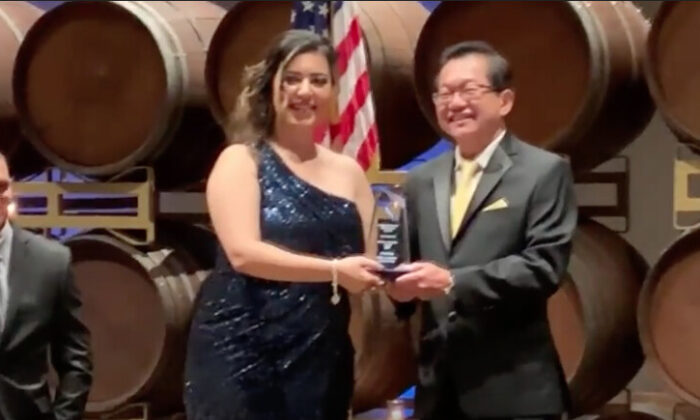Senate Confirms Trump Nominee Steven Menashi to 2nd Circuit Court of Appeals
The California Narcotic Officers’ Association (CNOA) has named an anti-marijuana leader in northern California the California Citizen of the Year.
The award was announced while the U.S. Senate is in the process of making new cannabis banking legislation.
According to a joint press release from Organization for Justice and Equality (OJE) and California Coalition against Drugs (CCAD), Frank Lee was named Citizen of the Year by both the CNOA statewide office and the Region I office. Lee is the president of both OJE and CCAD.
Lee received the award from the CNOA Region I office on Oct. 24 and will receive the award from the CNOA statewide office later this month.
The CNOA recognized Lee for leading communities in battles against commercial marijuana legislation in California, repudiating commercial marijuana ordinances in local jurisdictions such as the cities of Milpitas and Mountain View, and stopping San Francisco from opening the nation’s first government-operated safe drug injection center.
The new marijuana banking legislation in the U.S. Senate, called the Secure and Fair Enforcement Banking Act or the Safe Banking Act, was passed by the House in late September by a vote of 321 to 103, with support from almost all the Democratic representatives and nearly half of the Republicans.
The Safe Banking Act would allow the cannabis industry to access banking and financial services while marijuana remains a controlled substance according to federal law.
OJE and CCAD recently issued an open letter asking the public to support the efforts to stop the Safe Banking Act in the U.S. Senate.
“We are a coalition of citizens in California and we strongly oppose the Safe [Banking] Act (S1200) which, if passed, would allow marijuana companies to have banking privileges. This is detrimental to our country and sets up a very bad precedent,” the open letter states.
“Federal legislators should not hastily and forcefully move to legalize marijuana banking at the federal level. This virtually pushes all the states to accept the legalization of marijuana. The debate of legalization should come first,” the letter states. “Allowing banking access for a Schedule I prohibited drug sets a terrible and unacceptable precedent to other criminal activities.”
Marijuana is currently listed as a Schedule I controlled substance by federal law.
The Safe Banking Act was introduced to the House by Colorado Democratic representative Ed Perlmutter on March 7. The bill was introduced after Robert Troyer, U.S. Attorney for the District of Colorado, published an article on Sept. 28, 2018, titled “It’s High Time We Took a Breath from Marijuana Commercialization.”
In his article, Troyer described the situation of marijuana commercialization in Colorado: “Now Colorado’s youth use marijuana at a rate 85 percent higher than the national average. Now marijuana-related traffic fatalities are up by 151 percent. Now 70 percent of 400 licensed pot shops surveyed recommended that pregnant women use marijuana to treat morning sickness.”
On Aug. 29, U.S. Surgeon General Jerome Adams and Secretary of U.S. Health and Human Services Department Alex M. Azar together issued a 10-minute video to oppose the use of marijuana by youngsters and pregnant women.
In the video, Azar stated that the concentration of the chemical THC in marijuana has tripled over the past few decades, and it is a fundamentally different product from what it was several decades ago.
“It is not your mother’s marijuana,” Adams said in the video.
“We know now that no amount of marijuana use during pregnancy or adolescence is safe,” Azar said.
Adams stated that in 2017, the number of new marijuana users between the ages of 18 and 25 rose almost 30 percent, and the total number of marijuana users between the ages of 12 and 25 exceeded 9 million. Adams said that between 2002 and 2017, the number of pregnant women using marijuana doubled.
President Donald Trump announced earlier this year that he would donate 25 percent of his annual salary to partially fund a digital media campaign on the negative effects of marijuana on adolescents and pregnant women.
In California, narcotic officers have been vocal in opposing many new state laws to legalize the use of controlled substances that are listed by federal law. OJE and CCAD have been close allies of the CNOA.
“We want to continue doing a better job in our fight against drugs with California narcotic officers and our allies,” Frank Lee stated in the press release from OJE and CCAD.
This article is from the Internet:California Organization Rewards Anti-Marijuana Leader While U.S. Senate Discusses Cannabis Banking Legislation
Trump’s Call Transcript Appears to Refute Statement from Yovanovitch’s Private Deposition
